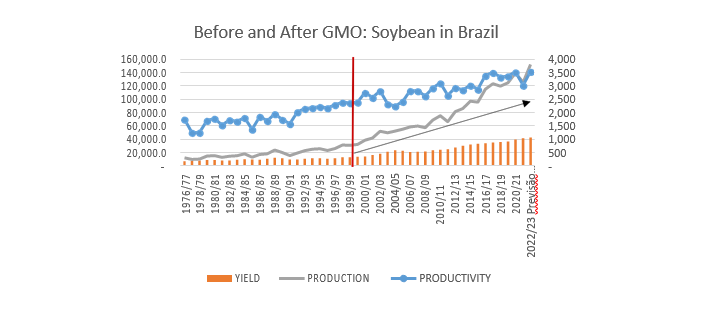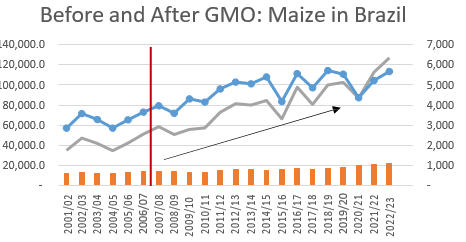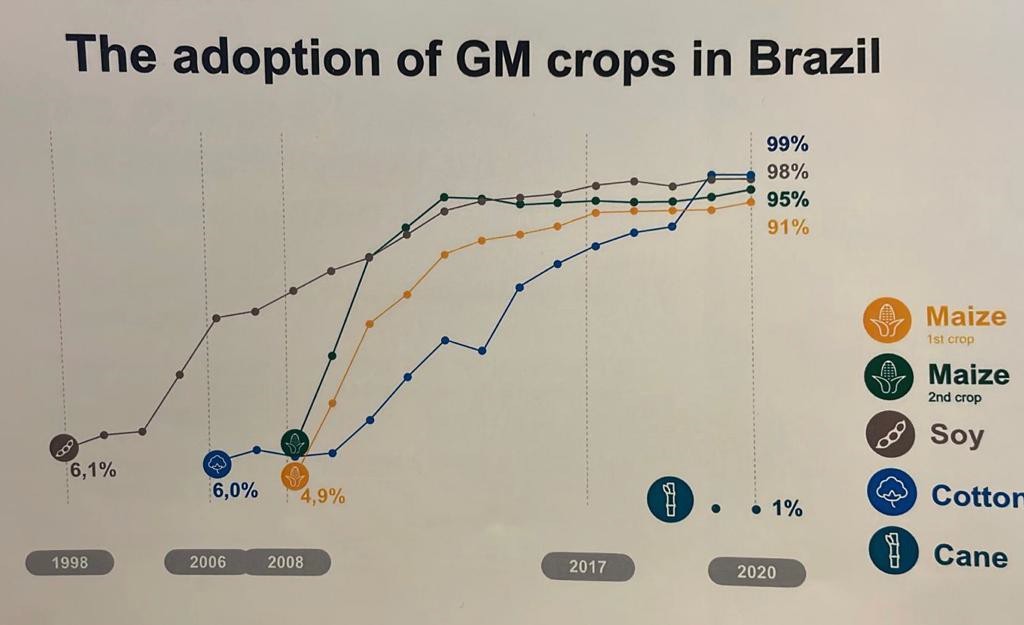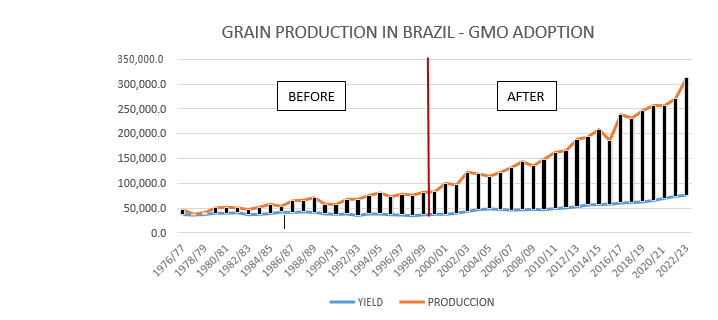Particularly hit by the effects of climate change, African farmers are staring at reduced crop production. Could Genetically Modifi(ed (GM) crops provide the much needed support to boost production? We speak to Paulo Bertolini, president of Sector chamber of equipment for grain storage at Brazilian Machinery and Equipment Industry Association (ABIMAQ).
FRA: Describe the history of GM crops
Bertolini: GMOs have been commercialized since 1996 and their applications, safety and benefits have been amply documented in numerous scientific publications. GM crops with innovative agronomic, environmental and nutritional characteristics continue to be developed and cultivated across the world. By 2019, more than 190 million hectares of GM crops were grown in 29 countries, with notable additions in Africa and Asia.
FRA: What are the advantages of GMO crops?
Bertolini: GMO crops have operational, economic-, social- and environment benefits. Biotechnology helps farmers to increase yield per hectare, reduce the use of plant protection products and conserve the quality and biodiversity of the soil and the environment – all key aspects in sustainable production of food crops. GM crops make it easier to avoid tilling the soil, resulting in a healthier soil, fewer field passes and operations with machinery. This reduces fuel use and cost as well as CO2 emissions.
Biotechnology’s environmental benefits have been documented in numerous scientific studies. For example, a 2018 meta-study analysis by the Institute of Life Sciences in Italy1, of 6,006 peer-reviewed studies from 1996 to 2016 showed that genetically modified (GM) maize produced a greater yield of between 5.6 % to 24.5 % compared to non-GM maize. Data came from GM maize production in the United States, Europe, South America, Asia, Africa, and Australia. The researchers also noted that several of these peer-reviewed studies showed the use of GM maize reduced the active ingredient of herbicides and insecticides by 10.1 % and 45.2 %, respectively. A 2018 report (Brookes & Barfoot2) found that the adoption of GM herbicide tolerant (GMHT) maize resulted in a significant reduction in the volume of herbicide active ingredient usage (a reduction of 242 million kilograms of active ingredient) and an improvement in any associated environmental impact.
FRA: What are the risks involved in GMO crops
Bertolini:Over the past 27 years millions of consumers across the world have eaten foods made or derived from GM crops with no identified health problems. Livestock, poultry, and companion animals have eaten billions of GM feed without any negative effects on their health and welfare.
1. Impact of Genetically Engineered Maize in Agronomic, Environmental and Toxicological Traits: a Meta-analysis of 21 years of field data, Institute of Life Science, University of Pisa, 201
2. Environmental impacts of genetically modified (GM) crop use 1996-2016: Impacts on pesticide use and carbon emissions, GM Crops & Food, Graham Brookes & Peter Barfoot, 2018
The safety of GM foods has been confirmed by every competent body that has considered the issue. Indeed, the only time a safety differential has been confirmed, it was found that biotech crops and foods are safer.i
To date, more than 3,000 scientific studies have assessed the safety of GM crops for human health and environmental impact. These studies, together with numerous reviews performed on a case-by-case basis by regulatory agencies around the world, have enabled a solid and clear scientific consensus: GM crops have no more risk than those that have been developed by conventional breeding techniques.ii
A report by the scientific academies of Brazil, China, India, the UK, the U.S. and the Third World Academy of Sciences emphasized the safety of GM crops: “GM technology …. should be used to increase the production of main food staples, improve the efficiency of production, reduce the environmental impact of agriculture, and provide access to food for small-scale farmers.”iii
FRA: Some scientists have said that GMO can cause cancer what are Brazil experts saying?
Bertolini: Groups ranging from the World Health Organization, the Royal Society of Medicine (UK), the European Food Safety Authority (EFSA), and the International Seed Federation (ISF), along with various governing bodies on every continent around the world have all affirmed the safety of GMO crops. Since 1992, more than 40 government agencies have given approvals for GMO food, feed, and cultivation. In many countries, multiple agencies are involved in the regulation of GMOs.
As per the above response, the scientific consensus is that GMOs are safe. A 2012 study (Seralini) that claimed GMOs caused cancer in mice was discredited by all reputable scientific agencies in the world, including by ANSES in France and the European Food Safety Authority (EFSA). The scientific publication subsequently retracted the Seralini study.
All GMOs on the market have been rigorously assessed by regulatory agencies around the world, including in Brazil. The assessment and authorization of GMOs in Brazil is conducted by CTNBio, a government entity. Brazil has approved numerous GM crops for cultivation, import, processing and use in food and feed.
GMO foods have a long, safe track record during their more than 20 years on the market. The prestigious National Academies of Science agrees with US regulatory agencies, scientists, and leading health associations worldwide that food grown from GM crops is safe to eat, and no riskier than consuming the same foods containing ingredients from crop plants modified by conventional plant breeding techniques.
FRA: How can the influx of substandard GMO seeds be regulated?
Bertolini: The quality of GMO seeds are regulated in the same way as conventional seeds.
FRA: Some people have said that no crop can grow in soils that had GMO crops before. Is this true?
Bertolini: No, this is not true. GM DNA does not remain in the soil after harvest.
FRA: Some have argued about pollination between the GM crops and those that are not. Does this pose any danger to either crops?
Bertolini: No, GM crops that are authorized for cultivation are safe for human health and for the environment. Some crops (like soybeans) do not cross pollinate. Others do cross pollinate (like maize), but with adequate measures (different planting times, adequate distances between fields), GM maize can be produced without impacting non-GM maize. Since GM maize offers more protection against weeds and damaging insects than conventional crops, conventional fields that are next to GM crop fields actually tend to benefit from this.
Has GM crops been proven to boost food security?
Yes. GM crops have higher yields than conventional crops. Up until the 1970s, Brazil was a food importer, but following the green revolution and later the adoption of GMOs, Brazil became one of the largest food exporters in the world.350,000.0
Productivity before the adoption in soy of GMOs in Brazil in 1998 was 2,367 kilos per hectare of soy, currently it is 3,552, an increase of 50%. In 1998, the cultivated area was 12.9 million hectares and a production of 30 million tons. Using the current productivity of 3,552 kilograms per hectare, 45 million tons would be produced, an increase of 15 million tons in the same area. The increase in productivity brought increased profits for producers, which led to an increase in the planted area and Brazil became the largest soybean producer in the world.
In the case of corn, the planting of GMOs started in 2007, the productivity was 3,972 kilos per hectare, now it is 5,665, an increase of 42%. In 2007, the planted area was 14 million hectares and a production of 58 million tons. If the productivity were the same as today of 5,665, the production would be almost 80 million tons, an increase of 22 million tons.

FRA: Are GMO crops largely accepted in Brazil?
Bertolini: Yes, Out of the total areas cultivated, 99% of cotton, 98% of soybeans, 95% of second crop corn and 91% of first crop corn are GMO. GMOs are not a concern for the large majority of Brazilian consumers.
 The adoption of the GMO allowed the cultivation of crop varieties earlier in the regular growing season, which made it possible for producers to grow a second corn crop after the soybean harvest in the same year. Today 80% of corn production in Brazil is harvested from the second crop.
The adoption of the GMO allowed the cultivation of crop varieties earlier in the regular growing season, which made it possible for producers to grow a second corn crop after the soybean harvest in the same year. Today 80% of corn production in Brazil is harvested from the second crop.
Corn Production in Brazil: First Crop and Second Crop
i .Genetically Engineered Crops: Experiences and Prospects. National Academy of Sciences January 2017. http://www.nap.edu/catalog/23395/genetically-engineered- crops-experiences-and-prospects
ii.The National Academies Genetically Engineered Crops: Experiences and Prospects,May 17, 2016
iii. National Academy of Sciences. 2000. Transgenic Plants and World Agriculture. Washington, DC: The National Academies Press. https://doi.org/10.17226/9889.









